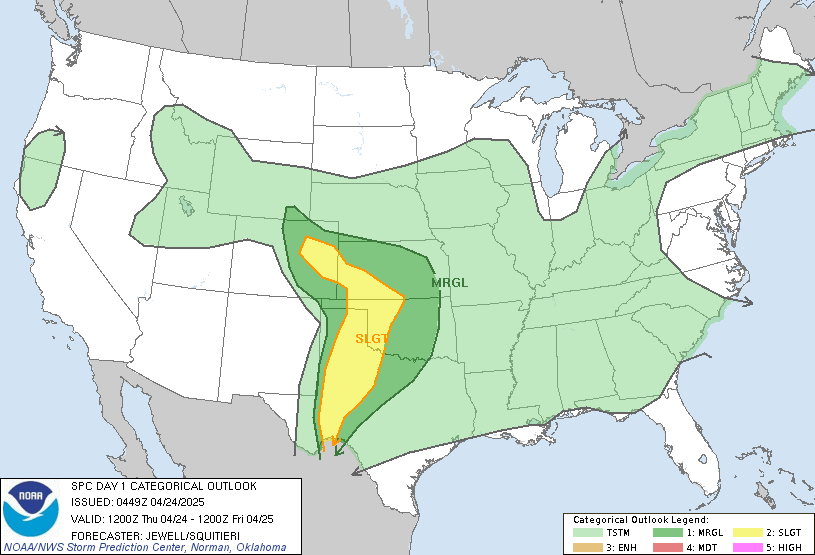LIVE MAP (ABOVE) ... SPC 1200Z Day 1 Outlook
Day 1 Convective Outlook
NWS Storm Prediction Center Norman OK
0100 AM CDT Sat Jun 17 2023
Valid 171200Z - 181200Z
...THERE IS AN ENHANCED RISK OF SEVERE THUNDERSTORMS ACROSS PARTS OF
THE SOUTHERN AND CENTRAL PLAINS...
...SUMMARY...
Severe thunderstorms associated with damaging wind gusts and large
hail are expected to develop this afternoon and evening across the
southern and central Plains. Wind gusts above 70 knots and
hailstones greater than 2 inches in diameter will be possible. The
severe threat could reach the Ark-La-Tex after midnight. Isolated to
scattered severe thunderstorms are also expected in Florida, and
along parts of the central and eastern Gulf Coast.
...Central and Southern Plains...
A shortwave trough will move across the southern and central Rockies
today towards a moist and unstable airmass in the southern and
central Plains. At the surface, a low will deepen in west Texas near
a dryline that will extend northward into eastern Colorado.
Low-level convergence will increase along the dryline as surface
temperatures warm during the day. This should result in convective
initiation in the vicinity of the Palmer Divide during the early
afternoon. The convection is forecast to expand in coverage, and
develop into an MCS during the late afternoon and early evening. The
MCS is forecast to track east-southeastward from southeast Colorado
into southern Kansas and Oklahoma.
A 45 to 60 knot mid-level jet associated with the shortwave trough,
is forecast to move eastward into the southern High Plains today.
Ahead of this feature, a moist and very unstable airmass will be in
place form the Texas Panhandle extending east-southeastward across
much of Oklahoma and northeast Texas. Surface dewpoints from the mid
60s to lower 70s F will contribute to moderate to strong instability
by afternoon, with MLCAPE likely reaching the 3000 to 5000 J/kg
range. In addition to an impressive thermodynamic environment,
kinematics will improve during the day as the mid-level jet
approaches. By late afternoon, RAP forecast soundings along the
track of the expected MCS have supercell wind profiles, with 0-6 km
shear around 50 knots. This, combined with 700-500 mb lapse rates
near 8.0 C/km will be very favorable for large hail. Hailstones of
greater than 2 inches in diameter will be possible with the more
intense supercells, associated with discrete cells that develop
ahead of the track of the MCS. A tornado, wind-damage and hail
threat is also expected to develop with supercells embedded within
the MCS. The greatest tornado threat is forecast in northwest
Oklahoma, where low-level shear will steadily ramp up during the
early to mid evening.
As the MCS organizes and moves southeastward into the strong
instability, supercells and bowing line segments are expected. The
wind-damage potential will likely increase during the early to mid
evening as the MCS accelerates east-southeastward in the southern
Plains. Wind gusts above 70 knots will become possible with cells
near the leading edge of the MCS during the evening. The linear MCS
is expected to move across central Oklahoma by late evening, and
could reach the western Ozarks or Ark-La-Tex during the overnight
period.
...Central and Eastern Gulf Coast into Florida...
An upper-level trough will move southeastward across the eastern
Gulf Coast states today. At the surface, a moist airmass will be in
place from the central Gulf Coast eastward to Florida where
dewpoints will be from the upper 60s to the mid 70s F. It appears
that an outflow boundary will be in place in southern Mississippi
and southern Alabama, where low-level convergence will become
maximized during the day. As surface temperatures warm near this
boundary, thunderstorms are expected to form around midday. These
storms will move southeastward toward the immediate coastal areas
with a severe threat likely developing. RAP forecast soundings this
afternoon from Biloxi, Mississippi eastward into the Florida
Panhandle have MLCAPE peaking in the 3000 to 4000 J/kg range, with
steep lapse rates between 700 and 500 mb. This, combined with 0-6 km
shear in the 40 to 50 knot range should support supercell
development with isolated large hail. Hailstones of greater than 2
inches in diameter will be possible with the more intense cells. A
wind-damage threat will also be likely.
Further east across Florida, a moist airmass will be in place with
surface dewpoints in the 70s F. Thunderstorm development will take
place along sea-breeze boundaries as temperatures warm during the
day. A few thunderstorms will also develop further inland. RAP
forecast soundings in central Florida have MLCAPE peaking around
3000 J/kg, with 0-6 m shear in the 30 to 35 knot range. This,
combined with steep low-level lapse rates should be enough for an
isolated wind-damage threat. Hail will also be possible with the
stronger cells.
..Broyles/Jirak.. 06/17/2023
Read more CHECK UPDATE ZOOM GRAPHIC
http://dlvr.it/SqpYyq
Windy.com Temps | Gusts | WU KORD KPWK |
CLICK for this month's BIG night sky ... | RADAR FULL MAP SCREEN |
|---|
MOBILE DEVICE? Turn sideways. Weather conditions directly above are near Lakefront. Top tabs refer to O'Hare (official).
Archives for the SPC Convective Outlook are updated daily (approximately) with a live map at the beginning of each article. Follow the link at the end of the article to check for current updates on the NOAA/NWS Storm Prediction Center website. Also, see Archives for Chicago's hourly weather data on CARDINAL NEWS Magazine.
CONVECTIVE | TORNADO | WIND | HAIL
O'Hare International Airport KORD
(Arlington Heights South)
Chicago Executive Airport KPWK
(Arlington Heights North)
Saturday, June 17, 2023
SPC Jun 17, 2023 0600 UTC Day 1 Convective Outlook
SUNRISE AND SUNSET TIMES IN UTC (if you're not logged in to Google)
CHICAGO UTC-6 during CST (Central Standard Time, e.g., winter)
CHICAGO UTC-5 during CDT (Daylight Savings Time, e.g., summer)
CHICAGO UTC-6 during CST (Central Standard Time, e.g., winter)
CHICAGO UTC-5 during CDT (Daylight Savings Time, e.g., summer)





















